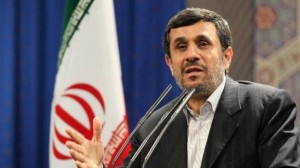 TEHRAN – Iran’s political landscape has become increasingly divided during controversial President Mahmoud Ahmadinejad’s second and final term. But as a diverse array of candidates to replace him takes shape, nearly all the contenders seem united on one thing: attacking the president’s legacy.
TEHRAN – Iran’s political landscape has become increasingly divided during controversial President Mahmoud Ahmadinejad’s second and final term. But as a diverse array of candidates to replace him takes shape, nearly all the contenders seem united on one thing: attacking the president’s legacy.
The eventual winner of the June election will wield influence over the direction of negotiations on Iran’s nuclear program, a topic of immense importance to the U.S. In Iran, however, the biggest election issue is the sagging economy, and most among an emerging list of about 20 candidates argue that it has been harmed as much by Ahmadinejad’s tenure as by international sanctions.
The growing field of hopefuls is generating fresh popular interest in an election that few believed would be competitive just a short while ago. That is in large part because candidates must be approved by Iran’s Guardian Council, a powerful body of clerics and jurists, half of whom are appointed by Supreme Leader Ayatollah Ali Khamenei.
Iran’s traditional conservative factions — known as principlists for their loyalty to the founding principles of the Islamic republic — make up the largest number of expected candidates. But instead of a field limited to conservatives, who once counted Ahmadinejad among their ranks but came to see him as a threat to their dominance, a number of candidates who many analysts believed would sit out for fear of not passing the strict vetting process have stepped forward.
Reformists, who have seen the modest social gains and improved foreign relations achieved during previous President Mohammad Khatami’s eight-year reign evaporate under the current administration, are lining up against the president.
Among them is the lead nuclear negotiator under Khatami, Hassan Rowhani, who announced his candidacy Thursday. The entrance of Rowhani, a cleric and one of the few moderate voices still prominent in Iran’s ruling system, diminished the likelihood that Khatami or former President Hashemi Rafsanjani — both allies of Rowhani — will run again, as had been speculated.
Three conservative former members of Ahmadinejad’s Cabinet, including former Foreign Minister Manouchehr Mottaki, have announced their candidacies and are also running on anti-Ahmadinejad platforms.
Ultraconservatives, led by Ayatollah Taghi Mesbah Yazdi, who was long seen as Ahmadinejad’s staunchest supporter in the clergy but is now among his most vocal critics, have not yet announced their candidacies but are expected to do so soon.
Touting slogans such as “Improvement and Justice,” “Victory of Honesty over Wealth and Power” and “Government of Ethics,” many candidates are targeting the millions of disenchanted Iranians who believe the Ahmadinejad years were a time of economic mismanagement, fraud within the banking system and a misguided foreign policy that has left Iran even further isolated from the international community than it already was.
In contrast, Ahmadinejad’s team — which is so far fielding two candidates — has adopted the slogan “Long Live the Spring,” a phrase variously interpreted as an exhortation to keep his faction in power and a reference to the movements that have toppled regimes in the Arab world.
An election season with high voter turnout has always been the preference of Iran’s ruling clerics, who consider participation as proof of popular support for their system. But a major concern of principlist and ultraconservative hardliners is that a high turnout might favor their adversaries.
According to official counts of the 2009 election, two reformist leaders won more than one-third of the vote. Their supporters and international observers assert that the total was much higher, however, and most agree that those who backed the reformists are unlikely to vote this year for any of the principlist candidates, who favor conservative social policies rooted in Quranic law.
This could create an opportunity for another reformist candidate or one backed by Ahmadinejad, whose circle has moved away from Islamic rhetoric in favor of a more nationalist tone.
With the principlists fielding the most candidates so far, there is a growing possibility that they will split each other’s votes, opening an easier path to victory for either a reformist or one of Ahmadinejad’s allies.
“A distribution of votes between our candidates will lead to defeat,” Ayatollah Nasser Makarem Shirazi, a leading conservative cleric, said in an interview with the Fars news agency last week. “The result of division between those loyal to the revolution will be defeat. It would be good if (principlists) create a coalition and zoom in on one person with the rest becoming helping hands.”
By The Japan Times
The Iran Project is not responsible for the content of quoted articles.

 QR code
QR code